|
| Author |
Message |
    
doug11k
Member
Username: doug11k
Post Number: 16
Registered: 12-2003
| | Posted on Wednesday, March 29, 2006 - 02:27 pm: | 




|
I have lived in Kennebunk. Maine most of my life & have heard of Emery engines but never saw one until today. In February while visiting Richard Durgee in Florida I asked if he had anything on Emery and he gave me a copy of an Emery Bros. 1912 advertisement. I was surprised that they were four cycle and available in 1, 2 & 4 cylinder models.
In any event I visited the Kennebunkport Historical Society today & got to take some photos of their engine, a 4 1/2 hp single, 4-cycle, serial #98, jump spark engine. This engine appears to be the same model engine shown in the ad Richard gave me. It has fairly small raised letters, "EMERY" in the cast crankcase covers. The engine was mechanically & cosmetically restored in 1975 and the engine did run at that time. Unfortunately the water jackets were not kept filled with glycol or anti-freeze and the cylinder has salt-cracked & is crumbling. Although engine still turns over jacket is 'holed' both externally & internally into cylinder. The missing carburetor was replaced with a Schebler D.
I think this engine was originally used on a lobster boat. The long clutch lever engages & disengages the propellar shaft and another shorter lever on stbd. side slides gear keyed to engine output shaft into or out of mesh with a drive sprocket which must have run a lobster pot hauler. Hauler(or other apparatus) could be used with prop shaft moving or not. I saw no way of reversing engine or shaft roation.
I believe all men shown in newspaper article have passed away except possibly the grandson. I have a few leads on local men with more knowledge of Emery Bros. & will try to contact them.
Does anyone recognize the brand of carburetor in the 1912 ad?
I will ask Richard to post photos for me. |
    
richarddurgee
Senior Member
Username: richarddurgee
Post Number: 1065
Registered: 11-2001

| | Posted on Wednesday, March 29, 2006 - 05:04 pm: | 




|
Doug's photos
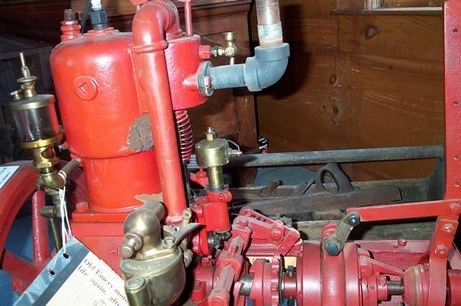
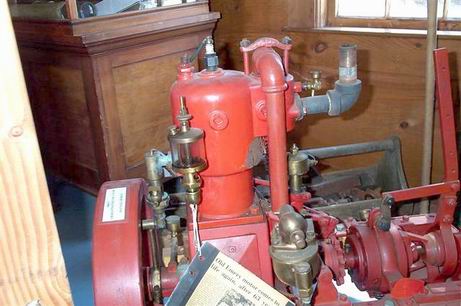
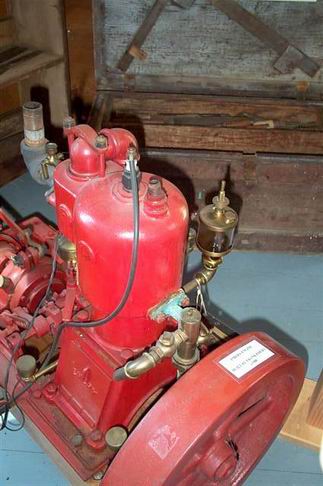


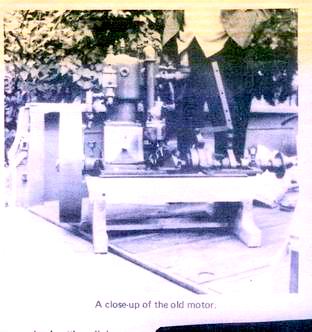

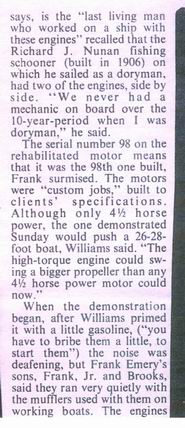
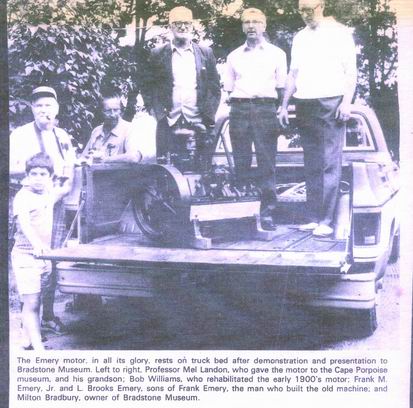
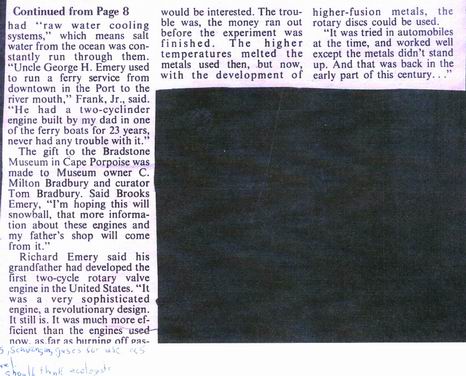 |
    
richarddurgee
Senior Member
Username: richarddurgee
Post Number: 1066
Registered: 11-2001

| | Posted on Wednesday, March 29, 2006 - 05:15 pm: | 




|
Emery Marine engine ad 1911-12
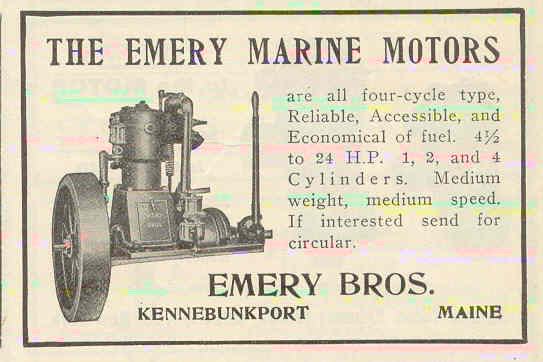 |
    
richardday
Senior Member
Username: richardday
Post Number: 316
Registered: 11-2003

| | Posted on Wednesday, March 29, 2006 - 09:02 pm: | 




|
Back about 1960 I had a neighbor who was presidend of a W.R.Grace Co. Research division. He had been on the senior staff of the Mahatten Project during WWII and a very interesting fellow. I explained to him my problem that all the old time watermen when they wore out a cylinder they would save it and fill the water jacket with used motor oil to keep the salt in the cast iron from being exposed to the air. If they didn't as the water jacket dried out the salt would expand and destroy the water jacket from the inside out. My problem was used motor oil made a big mess if there was any leakage and so I decided the best alternative that was readily available was automotive anti freeze with no water added. I asked him to exsplore with his Wizards 1. Would this really work over years and 2. What was a better approach. About a month later he came back to me and said Dick some of our lab types have tried to answer the same problem for the US Navy and their answer was used motor oil or automotive anti freeze works well and we cannot offer a better approach. I then started trying to alert local museums and collectors not to let their salt water cooled engines dry out or they would crack. The collectors listened but the museums commented "We know how to preserve our engines they are not going to freeze." They simply would not listen and some very nice engines cracked. Even then they would not listen. I think in more recent years museum people now are more receptive to the idea but it is sad to see some of the beautiful engines that sat out in damp old oyter shucking houses with the tide running in and out and the engines survied in that damp atmosphere with out cracking but once they were moved into dry museum building they were basically destroyed. The reason anti freeze is particularly useful is you can drain it off to run the engine and then put it back after the show. Try that with used motor oil and I doubt many of us would do it a second time. Anti freeze also has the advantage that if your engine happens to have any pockets of residual water after a show the anti freeze will mix with the water and keep the water from freezing which can happen when stored in cold climates.
Thought some of our newer collectors might find this of some use. Just remember once the cracking does stop its too late for anything but a few not too polite comments. |
|
|
|


|


